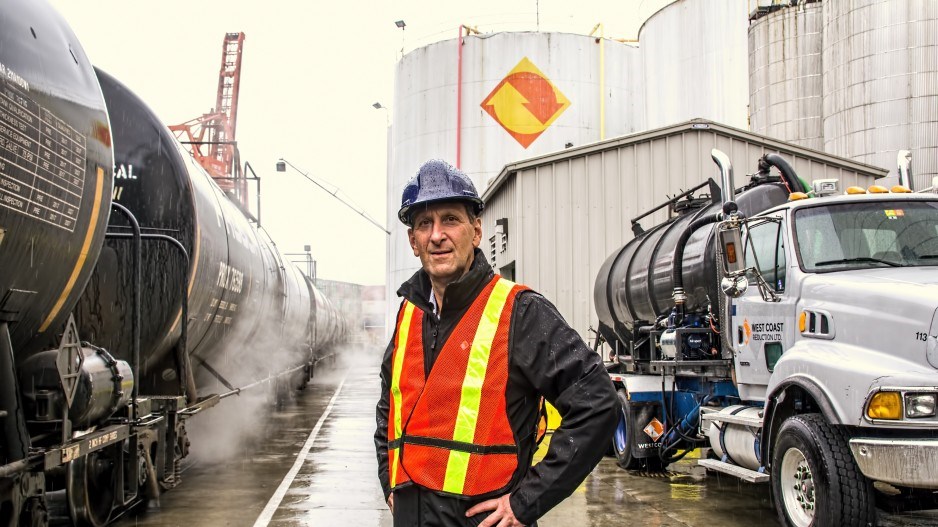Roughly 15% of all manmade greenhouse gases come from livestock production, according to the United Nations’ Food and Agriculture Organization.
But thanks to low-carbon and renewable fuel standards, some of the emissions from cattle, poultry, hog and fish production are now being offset by turning animal waste into renewable fuels, and one family-owned business in Vancouver is at the forefront of that growing market.
For half a century, West Coast Reduction has been taking animal waste from butchers and slaughterhouses and rendering it into proteins and oils that are used to produce pet food, animal feed, soap and other products.
More recently, though, it has been selling most of the tallow and lard it produces from animal waste to refiners, who blend it with crude oil to produce gasoline and diesel that meet low-carbon fuel standards in places like California, Oregon and B.C.
Parkland Fuel Corp. (TSX:PKI) is one of the petroleum companies now using recycled animal fats to produce the renewable fuel it needs to add to the gasoline and diesel it produces to meet B.C.’s low-carbon fuel standard.
It is now commercializing a process at its Burnaby refinery whereby oils – animal tallow and canola oil – from West Coast Reduction’s rendering plant is added to crude oil before it is turned into gasoline, diesel and jet fuel.
That’s not typically how refiners have been meeting low-carbon fuel standards. Many will simply add a renewable fuel, like ethanol or biodiesel, to gasoline and diesel at the end of the refining process.
“We’re also working on the development of different types of feedstocks that can be made from waste products, and West Coast Reduction will be a critical base supplier,” said Dave Schick, director of policy and external relations for Parkland.
“West Coast Reduction is a leader globally in this. They supply products as far as Singapore for this usage.”
West Coast Reduction is a family-owned business founded by the late Jack Diamond that now employs 400 people and does $250 million to $300 million in sales annually. Its main rendering plant and storage terminal is in East Vancouver. It also has collection and storage plants in Nanaimo, Edmonton, Calgary, Lethbridge and Saskatoon. The company also owns Redux Nutrition, which takes bread waste and uses it to make livestock feed.
The company collects animal waste – meat, bone, fat, blood – from slaughterhouses, butcher shops, restaurants and fish processors in B.C., Alberta and Saskatchewan. Restaurants across Western Canada also supply West Coast Reduction with grease and used cooking oils. The company has a fleet of about 100 trucks that collect the waste from suppliers across Western Canada.
“If we weren’t here, a lot of that stuff would end up in the landfill,” said West Coast Reduction CEO Barry Glotman.
The waste that the company collects is processed into two main products: proteins and fats. The company’s plant in Vancouver has a large tank farm that stores the products. The tank farm also stores canola oil.
The company uses the protein to make fish meal, pet food and livestock feed. The fats – tallow, lard, fish oil – traditionally went to the oleochemical industry for producing things like soaps and cosmetics. But most of those oils are now being sold to petroleum refiners.
“Today, that whole side of the business – 80% to 90% – has moved to energy,” Glotman said. “There’s this huge demand now for animal fats in the Pacific Northwest. It’s all driven by low carbon initiatives and mandates.”
B.C.’s low-carbon fuel standard started out in 2010 requiring 5% of gasoline and 3% of diesel to have renewable content (ethanol or biodiesel). That has since risen to 7.3% and 5.4%, respectively.
The requirements for renewable content will continue to increase. It’s estimated that, in B.C. alone, the low-carbon fuel standards will require 650 million litres of renewable fuel annually by 2030.
If all of that were made from animal waste and waste plant oil, that would require 630,000 tonnes of feedstock per year, Glotman said. West Coast Reduction currently processes 250,000 tonnes per year. So the demand in B.C. alone could triple.
“It’s a new market, and it’s a new demand, and today we’re at just a third of what British Columbia – only British Columbia – wants to get to,” Glotman said.
B.C. isn’t the only jurisdiction with a low-carbon fuel standard. California and Oregon also have clean or low-carbon fuel standards, and other countries, like the U.K., are tightening renewable fuel standards. In addition to Parkland, West Coast Reduction sells animal fats to BP (LON:BP), which uses the fats at its Cherry Point refinery, and Neste Oyj (HEL:NESTE) – one of the world’s largest biodiesel producers – buys oils from the Vancouver company for its refinery in Singapore.
“This is a huge new opportunity with exponential growth,” Glotman said.




